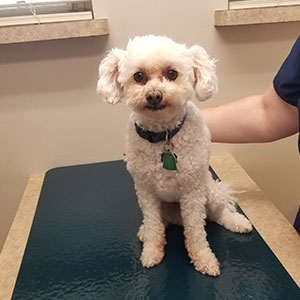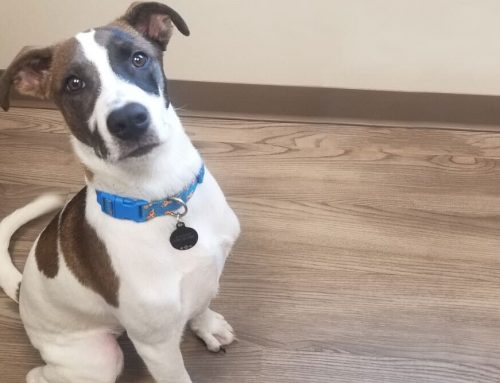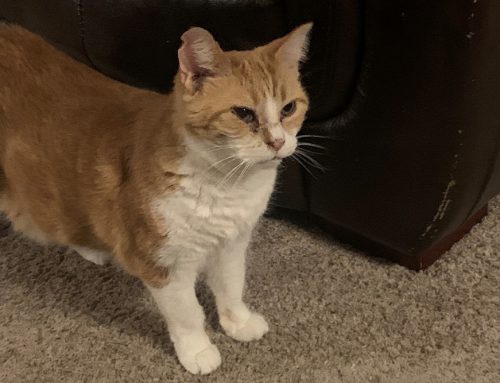“I think she looks good for her age…”
“At 10, I expect her to slow down. That’s a normal part of aging, isn’t it?”
“If I were his age, I’d be sleeping a lot too…”
Veterinarians are accustomed to hearing comments such as those when they’re examining senior pets.
“All those comments can be true, but age is not and should not be perceived as a disease,” said Dr. Kathy Passsinault. “If people went to their doctors and their complaints of fatigue were met with, ‘I guess you’re just getting old,’ patients would be rightfully upset. It could be true they’re getting old, but that is not a reason to dismiss conditions.”
Like human seniors, senior pets have different needs than younger pets. “That’s why it is important for owners to become more proactive as they care for older cats and dogs,” said Passinault. She explained that part of what veterinarians do for older pets is perform senior diagnostics. Those tests can help the doctors catch problems that have the potential to negatively affect the pets’ quality of life, and sometimes problems are caught early enough to prevent illnesses or conditions from becoming life-threatening.

Milo is a senior dog whose Addison’s disease was discovered through routine senior lab work.
Milo is a senior dog who was functioning fairly normally at home, but then his appetite started to decline. Milo’s owner asked for a senior health panel when he went in for an exam. Passinault found Milo’s health to be normal overall, but then she found significant abnormalities in his blood panel. “He had low sodium levels and high potassium levels,” she said. “He also had low glucose levels, so we tested Milo for Addison’s disease.” It turned out that was exactly what Milo had.
“Most of the time, animals are in crisis when the disease is diagnosed,” said Passinault, and Addison’s disease can be life-threatening. If a dog has reached an acute stage, it might vomit, have diarrhea and even abnormal heart rhythms that are all caused by abnormal electrolytes in their systems.
“Because Milo’s owner ran the senior screening tests, Milo was diagnosed early,” said Passinault. “He receives monthly injections now, and he is very healthy. He did not have to endure any of the symptoms that make pets with Addison’s disease so very ill.”
Greendale Village Vet doctors recommend cats who are 12 and older, and dogs who reach the age of 8 have senior health panels during their semiannual or annual exams. “We use those tests to give us a great deal of information,” said Passinault. “The panel includes bloodwork to screen for anemia, elevated white blood cells, diabetes, kidney disease, electrolyte imbalances, liver disease, thyroid disease, urinary tract infections, excess protein in the urine, and a fecal screening for parasites. While it doesn’t diagnose all senior problems, it is certainly a great place to start.”
For example, she said, Mocha was having a check-up, and the owners didn’t note any abnormalities or concerns. The senior panel told a different story. It turned out Mocha had an underlying urinary-tract infection. “Sometimes symptoms of urinary-tract infections are revealed when the pet strains while urinating, urinates more frequently and has increased thirst,” said Passinault.
“That is not necessarily the case with senior pets, though. If an infection goes undetected, there is a strong chance the bladder wall will thicken, stones may form, and the pet could develop a kidney infection.” When any of those things occur, the problem becomes bigger. “It is much more difficult to treat, and eventually the pet will have discomfort or pain.”

Mocha was diagnosed with a urinary-tract infection through a routine senior panel. Not all pets show symptoms early in their illnesses, so the screening panel is excellent for detecting problems before they cause serious trouble.
Shadow is a cat whose senior panel revealed some unexpected troubles. Her owner opted to run the panel just because she is an older pet. “When the results came back, we were able to diagnose hyperthyroidism and early renal disease,” said Passinault. “With early intervention, we were able to start medication to control her thyroid disease and improve her kidney disease.”
Passinault said owners should consider having senior screening panels for all older pets, because the test often reveals health issues that simply aren’t visible during physical exams. “Our pets rely on us to care for them as they age, so they can live their best lives,” said Passinault.
For more information, visit https://greendalevillagevet.com/ or call 414-421-1800.







Leave A Comment